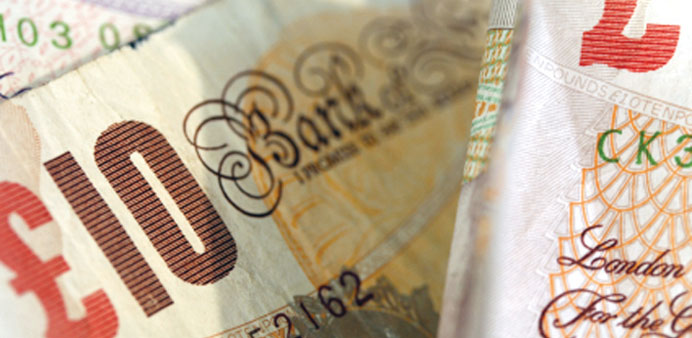The British pound came under pressure yesterday on a narrowing of opinion polls ahead of the vote on Scottish independence scheduled for September 18.
Dow Jones/London
European markets retained a cautious tone yesterday, with investors keeping one eye firmly on the lingering conflict in Ukraine while trying to gauge whether the European Central Bank will announce further stimulus measures at its policy meeting later in the week.
The Stoxx Europe 600 closed the session flat on the day, broadly in-line with Paris’ CAC. London’s FTSE clung to a slim gain after UK construction PMI reached its highest level for seven months in August. Germany’s DAX ended the session 0.3% higher.
Equities oscillated throughout the day. Some investors spoke of a compelling case for staying in stocks, especially in the light of possible new stimulus measures from the ECB. Others, however warned that the markets’ expectations may be becoming overly inflated.
Several banks, including Nomura and JP Morgan, have said they expect the ECB to take action at tomorrow’s meeting, possibly even announcing a broad-based asset purchase program known as quantitative easing, to help bring inflation back up to target.
Gary Jenkins, a credit strategist at LNG Capital, however, said that it’s as a close call. “My view is still that for [ECB] president Mario Draghi it remains a last resort, but he is in danger of being backed into a corner and left with little alternative but to enact QE at some stage,” Jenkins added.
“According to our economists, no rate cut and no major change in language to the ECB statement would be a key disappointment,” BNP Paribas currency strategists, wrote in a note.
Piling even more pressure on the ECB to act and fuelling expectations, data on Monday showed that activity in the eurozone’s manufacturing sector slowed more sharply than first estimated in August, with Italy joining France in contraction.
“If the central bank fails to act, or miscalculates, we could well see volatility on the rise,” warned Juan Valencia, a credit strategists at Société Générale.
In currency markets yesterday Russia’s rouble continued its steady slide, falling 0.3% against the US dollar after a heavy selloff on Monday when it hit an all-time low against the greenback
Elsewhere in currency markets, the US dollar jumped to a seven-month high against Japan’s yen at 104.86, on expectations that US monetary stimulus is near an end, while in Japan hopes emerged that a cabinet reshuffle could lead to increased stakes in domestic stocks for the country’s vast public pension fund.
The dollar has enjoyed support over the past few months, buoyed by a raft of improving US economic data, ranging from improving consumer confidence to better labour market conditions. US Federal Reserve officials recently signalled that they are on track to end their QE program in October.
In the UK, meanwhile, the pound came under pressure on a narrowing of opinion polls ahead of the vote on Scottish independence scheduled for September 18.
A YouGov survey for the Sun newspaper put the lead for the ‘no’ campaign at just six percentage points, excluding undecided voters.
That is down sharply from a previous 22-point lead recorded less than a month ago, and a 14-point lead seen mid-August.
The pound dipped 0.7% against the dollar to a five-month low of $1.6501 in late trade, and some are tipping it to fall further still.

